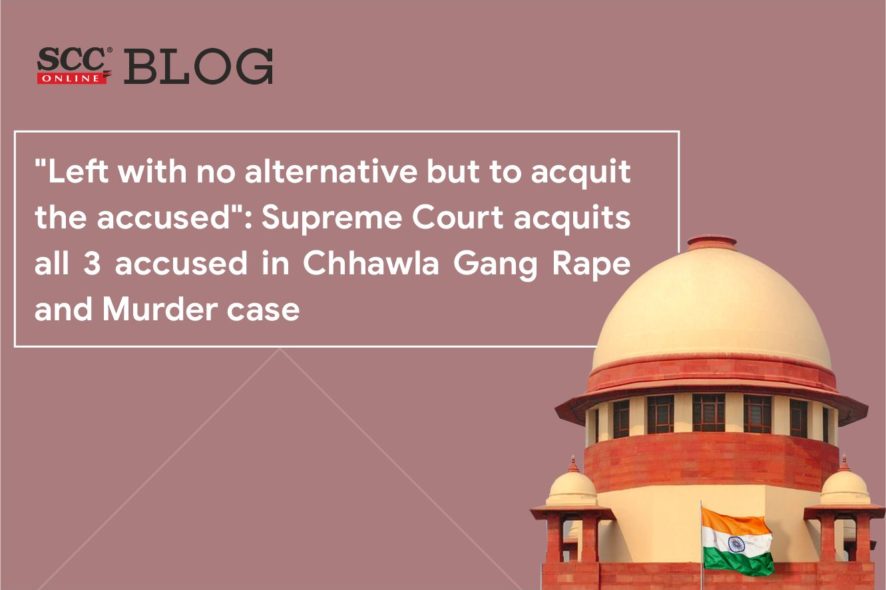Supreme Court: The 3-judge bench of UU Lalit, CJ and S. Ravindra Bhat and Bela M. Trivedi*, JJ has acquitted the three accused in the Chhawla kidnapping, rape and murder case by giving them a benefit of doubt as the prosecution was not able to prove the case against them beyond reasonable doubt.
Background
In the case at hand, a girl was allegedly kidnapped in Chhawla, gang raped, killed and dumped in the fields ahead of Jhajjar by the three accused. The girl was allegedly walking with her two friends when she was forcibly pulled inside an Indica car.
Three boys were arrested, who had later, admitted having kidnapped, gang raped and killed the victim.
The entire case of prosecution rested on the circumstantial evidence, and that the victim was raped and brutally murdered. The Trial Court relying upon the certain circumstances as “proved” convicted and sentenced the accused for the charged offences.
The Delhi High Court also believing the same set of circumstances as “proved” further noted that the two incriminating circumstances of the DNA of a strand of hair recovered from the girl’s dead body matching DNA of Ravi and DNA generated from semen spots found on seat cover of the Indica car matching DNA profile of Vinod were overlooked by the Trial Court.
Supreme Court’s Ruling
In the case at hand, the Supreme Court found it difficult to hold that the prosecution had proved the guilt of the accused by adducing cogent and clinching evidence. The evidence with regard to the arrest of the accused, their identification, discoveries and recoveries of the incriminating articles, identity of the Indica Car, the seizures and sealing of the articles and collection of samples, the medical and scientific evidence, the report of DNA profiling, the evidence with regard to the CDRs etc were not proved by the prosecution by leading, cogent, clinching and clear evidence much less unerringly pointing the guilt of the accused.
There were many glaring lapses having occurred during the course of the trial. Out of the 49 witnesses examined by the prosecution, 10 material witnesses were not cross-examined and many other important witnesses were not adequately cross-examined by the defence counsel. Hence, material witnesses examined by the prosecution having not been either cross-examined or adequately examined, and the trial court also having acted as a passive umpire, the Court held that the accused were deprived of their rights to have a fair trial, apart from the fact that the truth also could not be elicited by the trial court.
Stating that no conviction should be based merely on the apprehension of indictment or condemnation over the decision rendered, Court observed, it may be true that if the accused involved in the heinous crime go unpunished or are acquitted, a kind of agony and frustration may be caused to the society in general and to the family of the victim in particular, however the law does permit the Courts to punish the accused on the basis of moral conviction or on suspicion alone.
“The prosecution has to bring home the charges levelled against them beyond reasonable doubt, which the prosecution has failed to do in the instant case, resultantly, the Court is left with no alternative but to acquit the accused, though involved in a very heinous crime.”
The Court, hence, set aside the judgments and orders of conviction and sentence passed by the trial court and the High Court and acquitted the accused by giving them a benefit of doubt.
Effect of acquittal on compensation to victim’s family
The Court made clear that in view of Section 357(A) Cr.PC, the family members of the deceased- victim would be entitled to the compensation even though the accused have been acquitted and hence, the parents of the victim would be entitled to the compensation, if not awarded so far by the Delhi State Legal Services Authority, as may be permissible in accordance with law.
[Rahul v. State of Delhi, 2022 SCC OnLine SC 1532, decided on 07.11.2022]
*Judgment by: Justice Bela M. Trivedi
For Appellants: Ms. Sonia Mathur, Sr. Adv. (AC) Ms. Shivani Misra, Adv. Ms. Shreya Rastogi, Adv. Mr. Nikhil Chandra Jaiswal, Adv. Mr. Simranjeet S. Saluja, Adv. Ms. Pratiksha Mishra, Adv. Ms. Ronika Tater, Adv. Mr. Divik Mathur, Adv. Ms. Rupakshi Soni, Adv. A. Sirajudeen, Sr. Adv. Ms. Nidhi, AOR (SCLSC) Mr. Mohit Girdhar, Adv. Mr. Sarthak Arora, Adv. Mr. Harinder Mohan Singh, AOR Ms. Shabana, Adv.
For Respondent(s) Ms. Aishwarya Bhati, ASG Ms. Ruchi Kohli, Adv. Ms. Celeste Agarwal, Adv. Ms. BLN Shivani, Adv. Mr. Rustam Singh Chauhan, Adv. Mr. Aman Sharma, Adv. Mr. Manvendra Singh, Adv. Mr. Gurmeet Singh Makker, AOR Ms. Charu Wali Khanna, Adv. Dr. (Mrs.) Vipin Gupta, AOR







